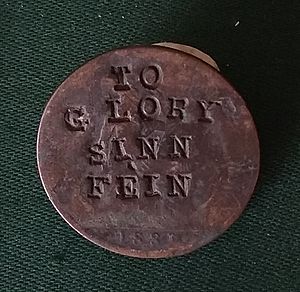Sinn Féin (slogan) facts for kids
Sinn Féin (pronounced "Shin Fane") is an Irish-language phrase meaning "ourselves" or "we ourselves". Another phrase, Sinn Féin Amháin ("ourselves only" or "ourselves alone"), was also used. These phrases became important political slogans for Irish nationalists in the late 1800s and early 1900s.
The idea behind "Sinn Féin" was that Ireland should rely on itself. However, what this meant politically was not always clear. Some people thought it meant creating a separate Irish republic. Others, like Arthur Griffith, thought it meant Ireland having a "dual monarchy" with Britain, where both countries shared the same king but had separate governments.
At first, "Sinn Féin" described individual political activists who wanted more independence than the main Irish political party, the Irish Parliamentary Party. In the 1890s, "Sinn Féin, Sinn Féin amháin" was a slogan for the Gaelic League, a group that worked to bring back the Irish language.
What Does "Ourselves Alone" Mean?
The direct meaning of sinn féin is "ourselves" or "we ourselves." Among people who spoke Irish, "Sinn féin! Sinn féin!" could also be a way to stop an argument, meaning "we are all together here!"
When English speakers started using the slogan, it was often translated as "ourselves alone." This translation became a popular political slogan too. It's not clear if the English or Irish version came first. Some historians believe "ourselves alone" was used because it better explained the idea of self-reliance. For example, writer Tom Kettle said in 1908 that "Sinn Fein" means "Rely on yourself alone."
However, some people think "ourselves alone" might have been used by opponents to make the nationalists seem selfish or isolated. During the First World War, a magazine called Punch even made fun of it, writing: "For Truth and Right the fools may fight, We fight but for 'Ourselves Alone.'"
A famous correction about the translation came from Christopher Hitchens. He pointed out that many people, including the poet Louis MacNeice, incorrectly translated Sinn Féin as "Ourselves Alone." He said the correct translation is "We Ourselves."
A British film from 1936, set during the Anglo-Irish War (1919–1921), was even titled Ourselves Alone.
Early Uses of the Slogan
The idea of "ourselves alone" appeared in Irish writings even before the political party.
In 1845, a collection of poems from The Nation, a nationalist newspaper, was published. One poem, called Ourselves Alone by John O'Hagan, included these lines:
- [...]Our hope and strength, we find at last,
- Is in OURSELVES ALONE.[...]
Another poem in the same book used the phrase "Sinn Féin." The book's notes explained "Sinn Féin" as "Ourselves—or 'OURSELVES ALONE.'" The glossary at the end of the book simply defined sinn féin as "we ourselves."
In 1882, a nationalist play by Thomas Stanislaus Cleary was titled Shin Fain; or Ourselves Alone.
Later, in James Joyce's famous novel Ulysses, which is set in 1904, a nationalist character shouts "Sinn Féin! Sinn Féin amháin!" These phrases were also the names of popular nationalist songs.
Sinn Féin After 1905
The name "Sinn Féin" was officially adopted by Arthur Griffith for his political ideas in 1905. The Sinn Féin political party was then formed between 1905 and 1907. The Irish poet Brian O'Higgins wrote the party's first rallying song, Sinn Féin Amháin, in 1905. This song was sung at all the group's meetings for several years.
In the 1910s, people often called militant Irish nationalists "Sinn Feiners," even if they weren't part of Griffith's actual party. This was often a negative term.
For example, in 1915, a student journal described different types of Irish nationalists:
- Separatists: Wanted an independent Irish Republic by force.
- Sinn Féiners: Wanted to end British rule through passive resistance (peaceful protest).
- Constitutionalists: Wanted "Home Rule" (limited self-government) through speeches and politics.
When the Irish Volunteers (a military group) split in 1914, the more radical part was quickly called the "Sinn Féin Volunteers" by British authorities. The 1916 Easter Rising, a major rebellion, was also quickly called the "Sinn Féin rebellion" by British newspapers.
However, Griffith's Sinn Féin party actually had no direct role in the Volunteers or the Rising, even though many of its members took part. After the Rising, all members of the party's main council were held in prison.
The difference between the specific Sinn Féin party and the broader idea of radical nationalism became less clear in 1917. This happened when Griffith gave up leadership of the party to Éamon de Valera, who was a senior leader from the Easter Rising.
During the Irish revolutionary period, the future national flag and national anthem were called the "Sinn Féin flag" and "Sinn Féin anthem." This was not just by those who supported British rule, but also by other Irish political groups.
In 1920, Sir Warren Fisher reported to the UK government about the British administration in Dublin. He said that the phrase "Sinn Fein" was used to criticize anyone who wasn't loyal to Britain. He noted that people with influence often linked "Sinn Fein" directly with violence.
 | Anna J. Cooper |
 | Mary McLeod Bethune |
 | Lillie Mae Bradford |


